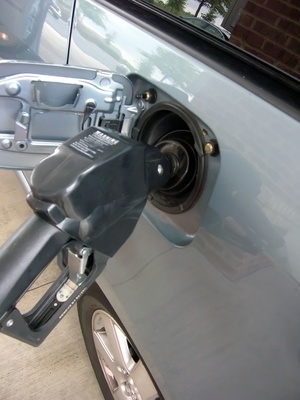
Ethanol is a form of ethyl alcohol, which is the same type of alcohol commonly used to make liquors. When added to regular gasoline, ethanol helps reduce pollution and dependence on foreign oil. E85 is a gasoline/ethanol blend that contains higher levels of ethanol than most gasoline engines are equipped to handle. Flex-fuel vehicles were designed to run using E85. If E85 is put in a traditional gasoline engine, it can cause several noticeable side effects.
Ethanol does not generate as much energy as gasoline does when it is burned. Therefore, when vehicles operate using ethanol-based fuel, they will get lower fuel mileage than they do with gasoline. Estimates vary as to exactly how much of a decrease occurs, but the EPA estimates that even the lowest ethanol blends, which contain 10 percent ethanol or less, still reduce fuel mileage by 3 to 4 percent.
Traditional gasoline engines will produce fewer toxic emissions if they operate using E85 fuel. Ethanol is a cleaner burning fuel than gasoline, so the vehicle should produce fewer potentially hazardous exhaust emissions. This may also reduce the amount of toxic emission buildup in your engine. Over the lifetime of a vehicle, running E85 may reduce engine problems associated with gas and dirt buildup caused by burning gasoline-based fuels.
Numerous possible side effects have been loosely connected with ethanol fuels that may affect a gasoline engine not designed to run on E85. However, there is no guarantee that any of these side effects will happen to your car if you run E85. Possible side effects include problems caused by ethanol's corrosive nature, fuel separation issues due to the relatively short shelf life of ethanol fuels, and a potentially shortened life for your vehicle's engine. The latter is due to the corrosive nature of the fuel as well as having to burn more fuel to operate at the same degree of efficiency, forcing the engine to work harder.